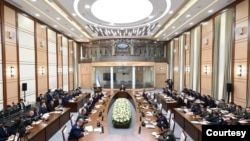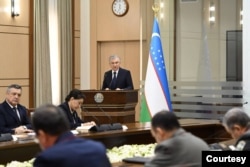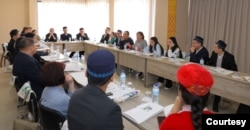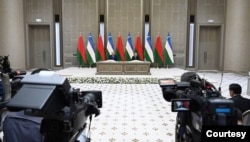Uzbekistan journalists began their year with their biggest newsmaker, President Shavkat Mirziyoyev, making the case for competitive and credible media, framing it as a needed antidote to the influence of foreign news outlets, principally those in Russia.
"If we do not take the creation of national content in the information space into our own hands and assess world events from the lens of our national security, others will do it from abroad," Mirziyoyev said, addressing security officials in Tashkent on January 12.
Without naming Moscow, Mirziyoyev was mainly referring to Russian propaganda, according to officials at the meeting. Just a few days earlier, on Russia's state-run Russian Today, or RT, ultranationalist Zakhar Prilepin had floated the idea of reannexing Uzbekistan. Tashkent promptly cautioned that such provocative statements "may have a negative impact" on relations. Russia's Foreign Ministry was quick to assert that Prilepin does not reflect Moscow's official stance.
Uzbekistan's political concerns, however, extend beyond such aggressive remarks. The pervasive influence of Russian information — and sometimes disinformation — is palpable across Central Asia, broadcast via hundreds of 24/7 channels and other digital media.
Trustworthy and resilient Uzbek media, Mirziyoyev underscored, is vital to the sovereignty and geopolitical interests of the state.
"If we do not satisfy our people's need for news and analysis, outsiders will," said Mirziyoyev. "This is unacceptable."
The president then asked the bureaucracy to work with journalists and bloggers to ensure truthful reporting, to be open to criticism, and constructively counter disinformation.
Uzbek media professionals who spoke with VOA hope that Mirziyoyev means what they want — less propaganda, more journalism.
But this would require systemic reforms.
'But in reality ...'
Gulnoza Khusanova, who possesses vast experience at Uzbekistan's only state-run broadcaster and private TV channels, wishes that news outlets and the government would support professional talent and allow them to practice their craft.
"Journalists and bloggers eager to produce quality content need to be convinced they won't be getting into trouble — prosecution and harassment — when raising critical issues," she told VOA. "So, freedom is what our media need most."
As a correspondent for UzReport TV within the presidential press pool, Khusanova appreciates Mirziyoyev's encouragement for a competent press. "But in reality, we see officials acting against his position as if they want to discredit him," she said.
Uzbek courts sentenced several journalists and bloggers to prison in the last three years. Otabek Sattoriy, sentenced to six and a half years in 2021 for defamation and financial crimes he never admitted to, went home this week with a suspended sentence. Many media professionals took to social media to insist he never should have been prosecuted.
The Uzbek public, says Khusanova, values news analysis and debate.
"Since they lack them here, our people turn to Russian media," she said. "To effectively respond to this problem, we need independent media and robust journalism. What the government offers is not news but propaganda. No one follows and trusts it."
Botirjon Shermuhammad, who spent years in Russia as a lawyer defending Central Asian migrants like himself, returned home in 2021 to launch Migrant.uz, a media network that has so far presented nearly 20 programs countering Russian disinformation, including about Uzbeks in Russia's war on Ukraine.
"Since labor migration is a significant political and economic factor, what we cover has everything to do with Uzbekistan and the world," Shermuhammad told VOA.
He too emphasizes the need for financially and professionally independent outlets. "We have a long way to go and must constantly train and experiment," he said. "We need an enabling space."
Government grants welcome
Shermuhammad thinks the government could fund the coverage of migration and environmental issues through grants, the way the United States Agency for International Development assisted his outlet in producing public awareness videos on Russian recruitment of migrants to fight in Ukraine.
Expressing similar views, Uzbek editors and producers suggest the best thing the authorities can do now is stop pressuring the media and demonstrate that Mirziyoyev's words reflect the will of the system he runs.
On February 2, the Mirziyoyev administration replaced Alisher Khodjaev, who had led the National Television and Radio Company (NTRC) for the last two decades — a network often described by many Uzbeks as a government mouthpiece. Abdurashid Jurabayev, a key official from the prime minister's office, has assumed the role.
"That does not change anything," said Anora Sodiqova, who started UzDiplomat.uz last year with a vision for hard-hitting journalism. "It still is a state monopoly, not turning into a public or private broadcaster. Yet another bureaucrat is in charge of it."
Echoing colleagues around the country, Sodiqova yearns for integrity in government and media. Among many things, she worries that Uzbek ministers, deputies, lawmakers, mayors and governors regularly retain journalists and bloggers via bribes or sponsorships to do their public relations work.
"Arbitrary conditions and negotiated questions are part of this charade, especially evident in interviews with influential political and business figures," she said.
At the same time, Sodiqova recognizes that simply gaining access to those in power and having the ability to engage them in a discussion is a necessary evil that many journalists and bloggers readily embrace. "Disrupting high-levels and probing them with facts and evidence is not an easy task."
In a recent podcast with bloggers, former Tashkent Mayor Jahongir Artikhodjaev, a business tycoon, belittled their influence at home and abroad, comparing their audience — "perhaps totaling a million at most" — with the followers of pop stars who amass several million on a single platform.
Artikhodjaev joined the discussion on the condition that no questions would be asked about his controversial mayoral tenure marred by corruption allegations. The host bloggers contended that allowing him to talk business and share his worldview was nonetheless revealing, and that they had no intention to debate with him.
This is the reason and manner through which Uzbekistan's media are deemed toothless, according to some prominent Uzbek journalists and bloggers.
"But this does not justify control and lack of accountability from current and former politicians and executives," said Sodiqova. "They act as if they are doing us favors by giving interviews and as if they owe no explanations to the public."
She and others also urge press services to respond to reporters' inquiries on pressing issues rather than push their products.
"Right now, the Uzbek national media content consists of paid publicity and special interest promotion. What the public needs is fact-based critical reporting that we are failing to deliver," Sodiqova said.
This story originated in VOA's Uzbek Service.










